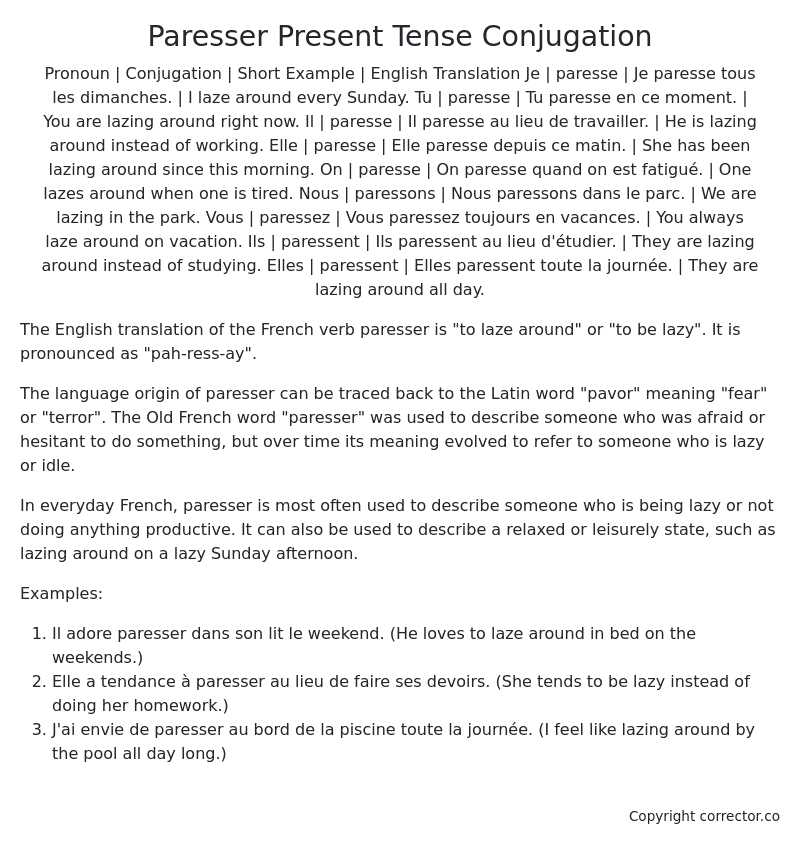Le Present (Present Tense) Conjugation of the French Verb paresser
Introduction to the verb paresser
The English translation of the French verb paresser is “to laze around” or “to be lazy”.
It is pronounced as “pah-ress-ay”.
The language origin of paresser can be traced back to the Latin word “pavor” meaning “fear” or “terror”. The Old French word “paresser” was used to describe someone who was afraid or hesitant to do something, but over time its meaning evolved to refer to someone who is lazy or idle.
In everyday French, paresser is most often used to describe someone who is being lazy or not doing anything productive. It can also be used to describe a relaxed or leisurely state, such as lazing around on a lazy Sunday afternoon.
Examples:
- Il adore paresser dans son lit le weekend. (He loves to laze around in bed on the weekends.)
- Elle a tendance à paresser au lieu de faire ses devoirs. (She tends to be lazy instead of doing her homework.)
- J’ai envie de paresser au bord de la piscine toute la journée. (I feel like lazing around by the pool all day long.)
Paresser – About the French Present Tense
To take a deep dive into all the French tenses then see our article on Mastering French Tense Conjugation.
Common Everyday Usage Patterns For Le Present
Interactions with Other Tenses
Table of the Present Tense Conjugation of paresser
Pronoun | Conjugation | Short Example | English Translation
Je | paresse | Je paresse tous les dimanches. | I laze around every Sunday.
Tu | paresse | Tu paresse en ce moment. | You are lazing around right now.
Il | paresse | Il paresse au lieu de travailler. | He is lazing around instead of working.
Elle | paresse | Elle paresse depuis ce matin. | She has been lazing around since this morning.
On | paresse | On paresse quand on est fatigué. | One lazes around when one is tired.
Nous | paressons | Nous paressons dans le parc. | We are lazing in the park.
Vous | paressez | Vous paressez toujours en vacances. | You always laze around on vacation.
Ils | paressent | Ils paressent au lieu d’étudier. | They are lazing around instead of studying.
Elles | paressent | Elles paressent toute la journée. | They are lazing around all day.
Other Conjugations for Paresser.
Le Present (Present Tense) Conjugation of the French Verb paresser (this article)
Imparfait (Imperfect) Tense Conjugation of the French Verb paresser
Passé Simple (Simple Past) Tense Conjugation of the French Verb paresser
Passé Composé (Present Perfect) Tense Conjugation of the French Verb paresser
Futur Simple (Simple Future) Tense Conjugation of the French Verb paresser
Futur Proche (Near Future) Tense Conjugation of the French Verb paresser
Plus-que-parfait (Pluperfect) Tense Conjugation of the French Verb paresser
Passé Antérieur (Past Anterior) Tense Conjugation of the French Verb paresser
Futur Antérieur (Future Anterior) Tense Conjugation of the French Verb paresser
Subjonctif Présent (Subjunctive Present) Tense Conjugation of the French Verb paresser
Subjonctif Passé (Subjunctive Past) Tense Conjugation of the French Verb paresser
Subjonctif Imparfait (Subjunctive Imperfect) Tense Conjugation of the French Verb paresser
Subjonctif Plus-que-parfait (Subjunctive Pluperfect) Tense Conjugation of the French Verb paresser
Conditionnel Présent (Conditional Present) Tense Conjugation of the French Verb paresser
Conditionnel Passé (Conditional Past) Tense Conjugation of the French Verb paresser
L’impératif Présent (Imperative Present) Tense Conjugation of the French Verb paresser
L’infinitif Présent (Infinitive Present) Tense Conjugation of the French Verb paresser
Struggling with French verbs or the language in general? Why not use our free French Grammar Checker – no registration required!
Get a FREE Download Study Sheet of this Conjugation 🔥
Simply right click the image below, click “save image” and get your free reference for the paresser Present Tense tense conjugation!

I hope you enjoyed this article on the verb paresser. Still in a learning mood? Check out another TOTALLY random French verb present conjugation!


